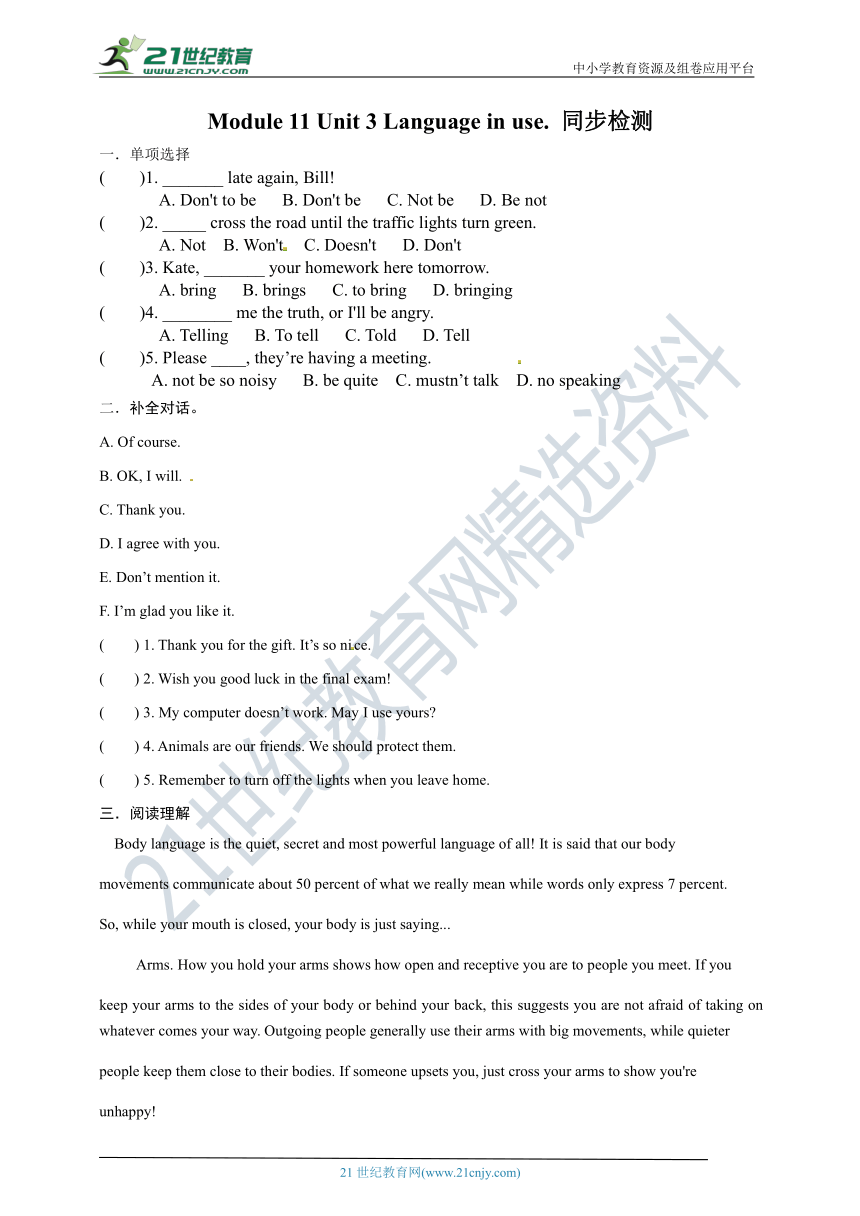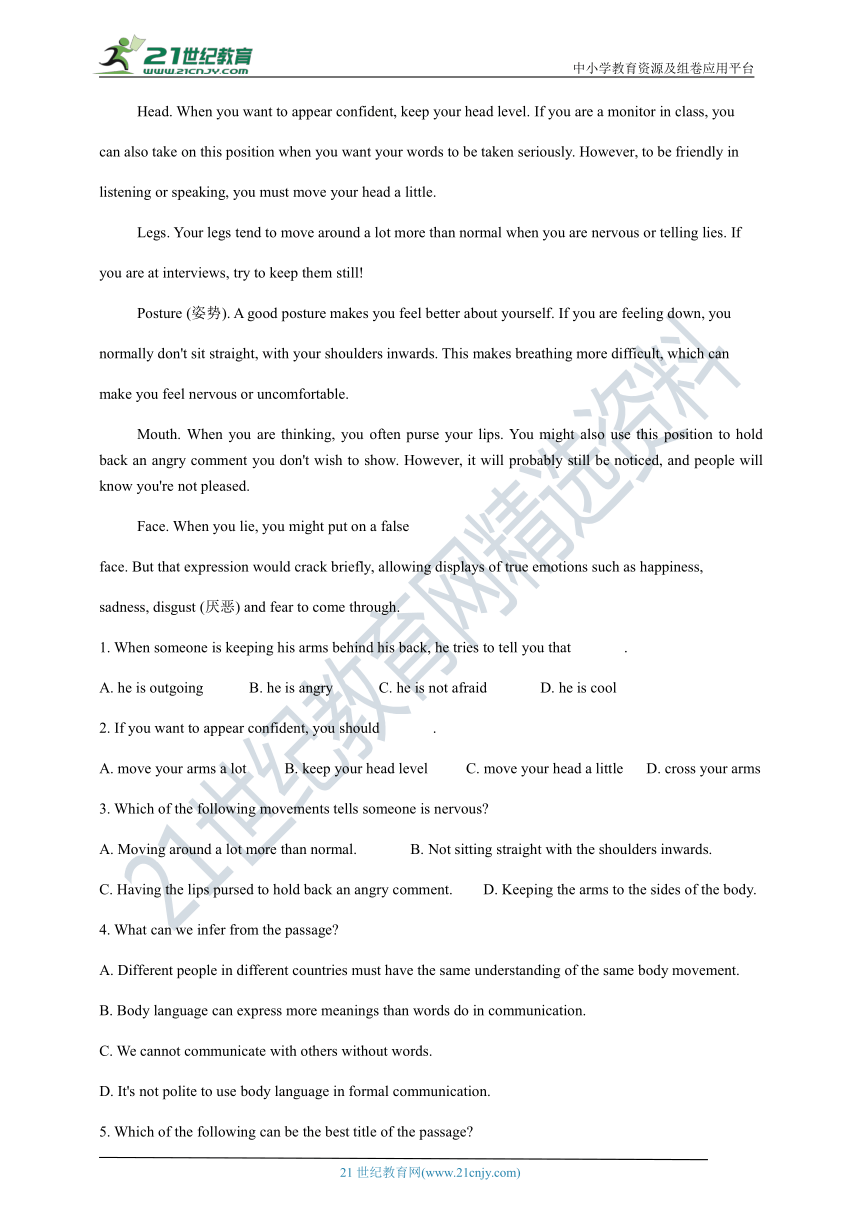Module 11 Unit 3 Language in use 练习
文档属性
| 名称 | Module 11 Unit 3 Language in use 练习 |  | |
| 格式 | zip | ||
| 文件大小 | 1.2MB | ||
| 资源类型 | 试卷 | ||
| 版本资源 | 外研版 | ||
| 科目 | 英语 | ||
| 更新时间 | 2019-06-04 11:38:24 | ||
图片预览


文档简介
中小学教育资源及组卷应用平台
Module 11 Unit 3 Language in use. 同步检测
一.单项选择
( )1. _______ late again, Bill!
A. Don't to be B. Don't be C. Not be D. Be not
( )2. _____ cross the road until the traffic lights turn green.
A. Not B. Won't C. Doesn't D. Don't
( )3. Kate, _______ your homework here tomorrow.
A. bring B. brings C. to bring D. bringing
( )4. ________ me the truth, or I'll be angry.
A. Telling B. To tell C. Told D. Tell
( )5. Please ____, they’re having a meeting.
A. not be so noisy B. be quite C. mustn’t talk D. no speaking
二.补全对话。
A. Of course.
B. OK, I will.
C. Thank you.
D. I agree with you.
E. Don’t mention it.
F. I’m glad you like it.
( ) 1. Thank you for the gift. It’s so nice.
( ) 2. Wish you good luck in the final exam!
( ) 3. My computer doesn’t work. May I use yours? [来源:学科网ZXXK]
( ) 4. Animals are our friends. We should protect them.
( ) 5. Remember to turn off the lights when you leave home.
三.阅读理解
Body language is the quiet, secret and most powerful language of all! It is said that our body
movements communicate about 50 percent of what we really mean while words only express 7 percent.
So, while your mouth is closed, your body is just saying...
Arms. How you hold your arms shows how open and receptive you are to people you meet. If you
keep your arms to the sides of your body or behind your back, this suggests you are not afraid of taking on whatever comes your way. Outgoing people generally use their arms with big movements, while quieter
people keep them close to their bodies. If someone upsets you, just cross your arms to show you're
unhappy!
Head. When you want to appear confident, keep your head level. If you are a monitor in class, you
can also take on this position when you want your words to be taken seriously. However, to be friendly in
listening or speaking, you must move your head a little.
Legs. Your legs tend to move around a lot more than normal when you are nervous or telling lies. If
you are at interviews, try to keep them still!
Posture (姿势). A good posture makes you feel better about yourself. If you are feeling down, you
normally don't sit straight, with your shoulders inwards. This makes breathing more difficult, which can
make you feel nervous or uncomfortable.
Mouth. When you are thinking, you often purse your lips. You might also use this position to hold back an angry comment you don't wish to show. However, it will probably still be noticed, and people will know you're not pleased.
Face. When you lie, you might put on a false
face. But that expression would crack briefly, allowing displays of true emotions such as happiness,
sadness, disgust (厌恶) and fear to come through.
1. When someone is keeping his arms behind his back, he tries to tell you that .
A. he is outgoing B. he is angry C. he is not afraid D. he is cool
2. If you want to appear confident, you should .
A. move your arms a lot B. keep your head level C. move your head a little D. cross your arms
3. Which of the following movements tells someone is nervous?
A. Moving around a lot more than normal. B. Not sitting straight with the shoulders inwards.
C. Having the lips pursed to hold back an angry comment. D. Keeping the arms to the sides of the body.
4. What can we infer from the passage?
A. Different people in different countries must have the same understanding of the same body movement.
B. Body language can express more meanings than words do in communication.
C. We cannot communicate with others without words.
D. It's not polite to use body language in formal communication.
5. Which of the following can be the best title of the passage?
A. Body language, the most commonly used language B. Arms tell more than legs
C. Facial expressions tell the truth D. One simple movement lets slip secrets of mind
四.从方框中选词并用其适当形式完成短文。
eat, much, left, polite, start, put, drink, somebody, rule, quiet
If you're going to a formal Western dinner party for the first time, you'd better know about Western table manners. It's(1)________ to follow them.
When you sit down at the table, take your napkin and (2) ________ it on your lap. The dinner always (3)________with a small dish. When you start eating, you should keep the fork in your (4)________ hand. It's polite to finish (5)________ everything on your plate, so don't take(6) ________food than you need. Maybe you don't know whether it's polite or not to speak loudly at the table. The answer is that you should speak (7)________ and smile a lot. When you drink to (8)________, you'd better raise your glass and take only a sip. Remember not (9)________ too much. If you can't remember these (10)________just do as other people do.
五.按要求完成句子
1.Come to my room. (改为否定句)
_______ _________ to my room.
2.Why don’t you see a film? (同义句)
_________ __________ __________ a film?
3.To learn English is important. (同义句)
_______ ________ important ________ __________ English.
4.You mustn’t leave your room. (改祈使句)
_________ __________ your room.
5.You can sing and dance. (改为否定句)
You ___________ sing ______________ dance.
Module 11 Unit 3 Language in use 同步检测答案
一.BDADB
二.FACDB
三.CBABD
四.1. polite 2. put 3. starts 4. left 5. eating 6. more
7. quietly 8. somebody 9. to drink 10. rules
五.
1.Don’t come
2.Why not see
3.It is, to learn
4.Don’t leave
5.can’t, or
21世纪教育网 www.21cnjy.com 精品试卷·第 2 页 (共 2 页)
HYPERLINK "http://21世纪教育网(www.21cnjy.com)
" 21世纪教育网(www.21cnjy.com)
同课章节目录
- Module 1 Lost and found
- Unit 1 Whose bag is this?
- Unit 2 Are they yours?
- Unit 3 Language in use
- Module 2 What can you do ?
- Unit 1 I can play the piano
- Unit 2 I can run really fast
- Unit 3 Language in use
- Module 3 Making plans
- Unit 1 What are you going to do at the weekends?
- Unit 2 We're going to cheer the players.
- Unit 3 Language in use
- Module 4 Life in the future
- Unit 1 Everyone will study at home
- Unit 2 Every family will have a small plane.
- Unit 3 Language in use
- Module 5 Shopping
- Unit 1 What can I do for you?
- Unit 2 You can buy everything on the Internet
- Unit 3 Language in use
- Module 6 Around town
- Unit 1 Could you tell me how to get to the Nationa
- Unit 2 The London Eye is on your right.
- Unit 3 Language in use
- Revision module A
- Module 7 My past life
- Unit 1 I was born in a small village.
- Unit 2 I was born in Quincy.
- Unit 3 Language in use
- Module 8 Story time
- Unit 1 Once upon a time….
- Unit 2 Goldilocks hurried out of the house.
- Unit 3 Language in use
- Module 9 Life history
- Unit 1 He left school and began work at the age of
- Unit 2 He decided to be an actor.
- Unit 3 Language in use
- Module 10 A holiday journey
- Unit 1 What did you do?
- Unit 2 This morning we took a walk.
- Unit 3 Language in use
- Module 11 Body language
- Unit 1 They touch noses!
- Unit 2 Here are some ways to welcome them.
- Unit 3 Language in use
- Module 12 Western music
- Unit 1 It's so beautiful!
- Unit 2 Vienna is the centre of European classical
- Unit 3 Language in use
- Revision module B
